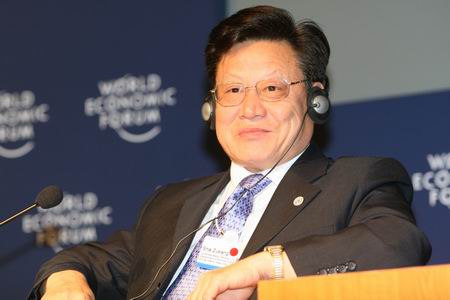
Sha Zukang, born in 1947, is a Chinese diplomat who is currently head of the United Nations Department of Economic and Social Affairs. He was previously the Chinese ambassador to the United Nations Office at Geneva.
I feel greatly honored to send a message to the 2010 Shanghai World Expo.Chinese Version>>
As is true with solemn UN Summits and with record-breaking Olympic Games, World Expos, by showcasing splendid achievements of civilization, can bring together countries of the world, uniting the peoples of the world in pursuit of cooperation, progress, innovation, peace and development. They can have far-reaching and historic impact.
So, too, will the 2010 Shanghai World Expo.
As the most representative and authoritative inter-governmental organization, the United Nations cherishes one cardinal objective:- to promote international cooperation and advance economic, social and cultural development.
Expos are committed to the same vision.
"Better City, Better Life" -- the theme of the 2010 Shanghai World Expo–represents a close link that connects the work of the United Nations with that of the World Expo.
This close relationship dates back many years.
Over the last few decades, we have witnessed the themes of Expos evolving, under the influence of the United Nations.
The changes in Expo themes, in turn, demonstrate how Expos have helped push forward historical trends.
In 1972, the United Nations convened the first international conference on the environment in Stockholm. Two years later, an international environmental fair–Expo 74 - was held in Spokane, Washington, which broke new ground as the first environmentally themed Expo in history.
In 1982, the first Expo with a theme focusing on energy–Energy Turns the World -- was held in Knoxville, Tennessee.
In 1992, the United Nations Conference on Environment and Development, also known as the Earth Summit, was convened in Rio de Janeiro. The Conference adopted Agenda 21, a programme of action for achieving sustainable development.
In response, World Expos have increasingly embraced the "sustainable development" concept. In 1998 the Lisbon Expo adopted the theme of "The Oceans, a Heritage for Future"; in 2000 the Hanover Expo focused on the theme of "Humankind, Nature, Technology”.
In 2002, the United Nations convened the World Summit on Sustainable Development in Johannesburg to further promote the harmonious relations between people, nature and economic growth.
In 2005, the Aichi World Expo adopted the theme of "Nature's Wisdom".
The 2010 Shanghai World Expo will continue this historical tie, featuring the theme of cities, exploring the future of global cities from the perspective of scientific development and sustainable development.
What a timely theme!
The 21st century will be an important period of urban development. The world's population living in cities has already exceeded more than half of the world total. The future growth of the world population will be mainly concentrated in the cities of developing countries. How to build harmonious cities to achieve sustainable development of cities is a significant and pressing global challenge.
China has the world's largest urban population -- about 580 million people; therefore, China is in the forefront of tackling the challenges of urbanization. China will need to achieve balanced relations between economic growth and environmental protection, between historical preservation and modernization, and between urban and rural development.
A better city, and more beautiful life–that is the dream of every resident in every city of the world.
I am convinced that the Shanghai World Expo will provide a platform for showcasing achievements, exchanging knowledge and experience, and promoting cooperation and innovation.
It will bring about a variety of innovative ideas and“happy surprises”and will generate a positive impact on urban life for the next one hundred years.
As the Pearl of the Orient, Shanghai should be a model for the world's cities.
In order for the Shanghai Expo to leave a rich spiritual legacy, and to impart lessons learnt and knowledge acquired, the United Nations, the Chinese Government and the Bureau of International Exhibitions together will convene a Summit Forum on 31 October, 2010, on the closing date of the Shanghai Expo.
The Summit Forum will adopt the "Shanghai Declaration", which will encapsulate the results of Expo activities, elevating the central message of the Expo theme. The Summit Forum will represent the climax and crystallization of six months of activities of the World Expo.
In 2010, the World Expo will be held for the first time in a developing country. China’s hosting of this event is no less than a global recognition of its great achievements in unshackling its backward past and in its historic journey toward prosperity.
During the years of the Manchu Dynasty, the government rejected Expos. Today the Chinese people embrace the Expos.
For many years the Chinese people have gone abroad to participate in Expos. In 2010, China will host the World Expo in Shanghai.
During its five thousand years of civilization, China has given the world the Four Great Inventions, as well as numerous other contributions. However, the four major ancient civilizations of the world remain developing countries today.
As China's earliest city open for foreign trade, Shanghai has witnessed a century of vicissitudes in China and of East-West collisions.
Yesterday’s China was weak; Today’s China is catching up.
The 2008 Beijing Olympic Games and the 2010 Shanghai World Expo will go down in history as key milestones in China's modernization process. A confident and prosperous China is an important force for promoting world peace, development and cooperation.
I was born in Shanghai. I take great pride in a successful World Expo in Shanghai and in the motherland's economic development and social progress.
As the United Nations Under-Secretary-General in charge of economic and social affairs, it is my mission to respond to the challenges of development, to dedicate myself to achieving global economic growth, social progress and sustainable development.
In fulfilling this important responsibility, I will do my level best to contribute to the success of the Expo.
I wish the 2010 Shanghai World Expo great success.